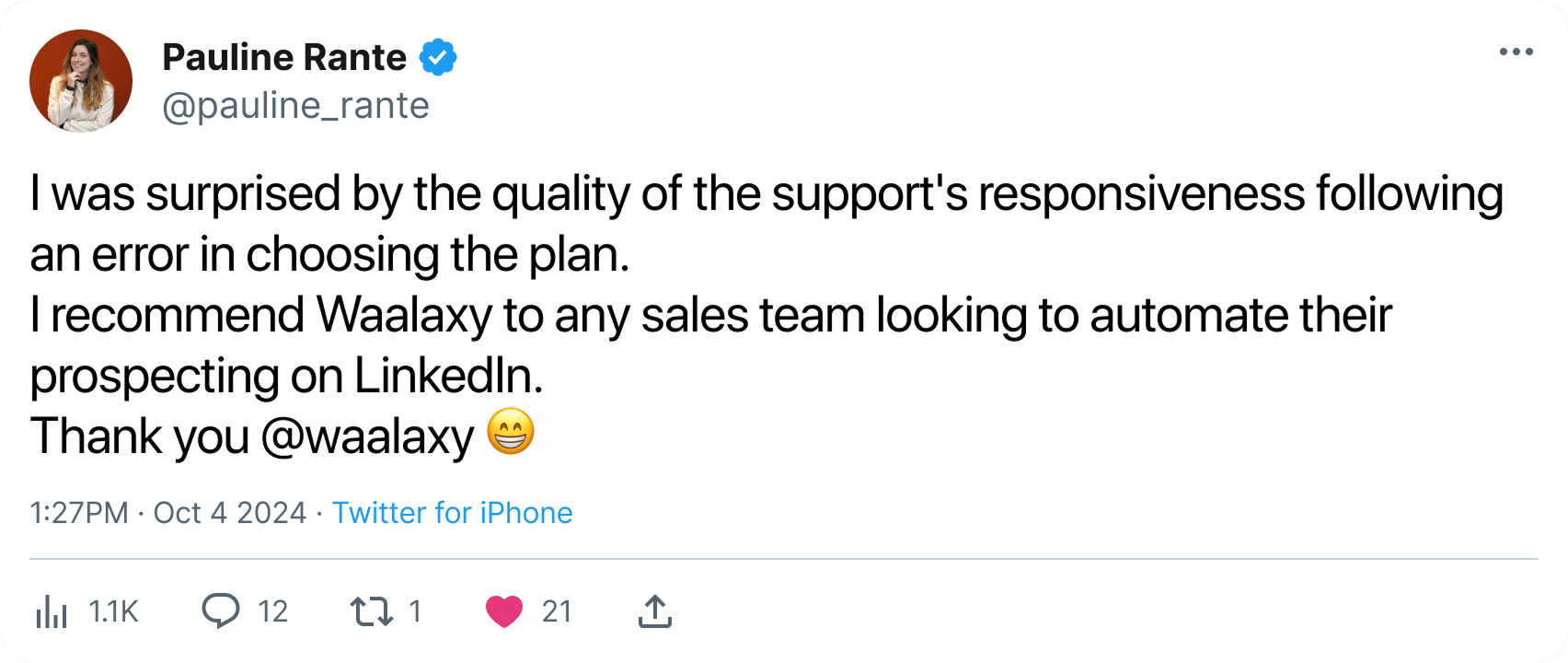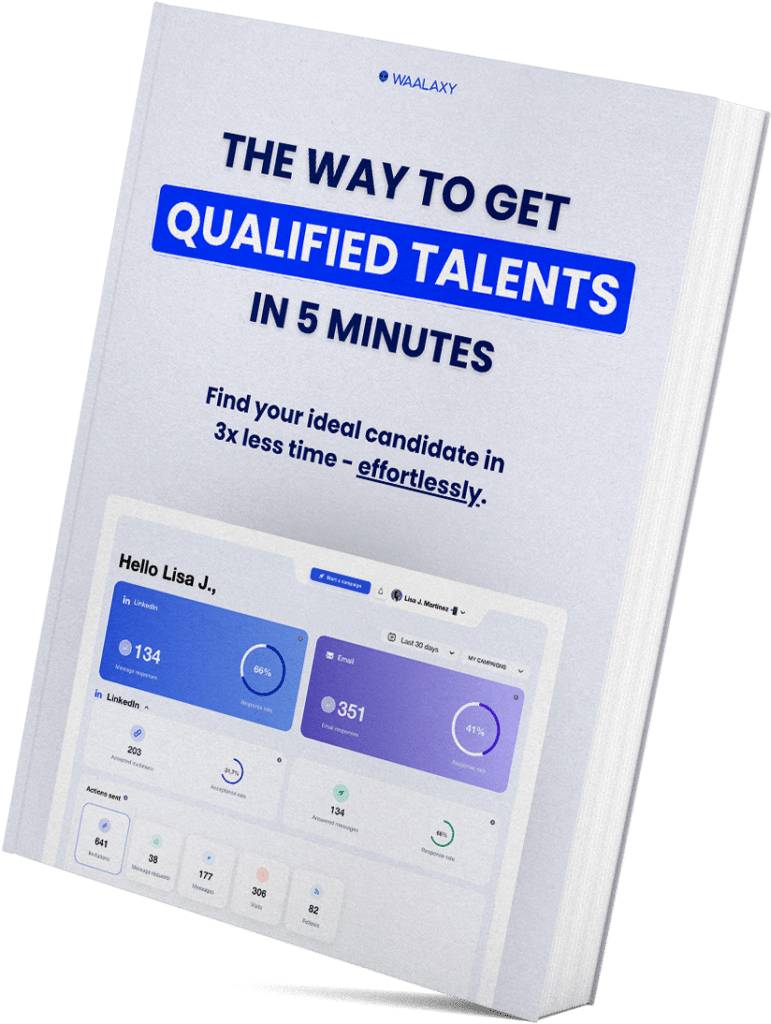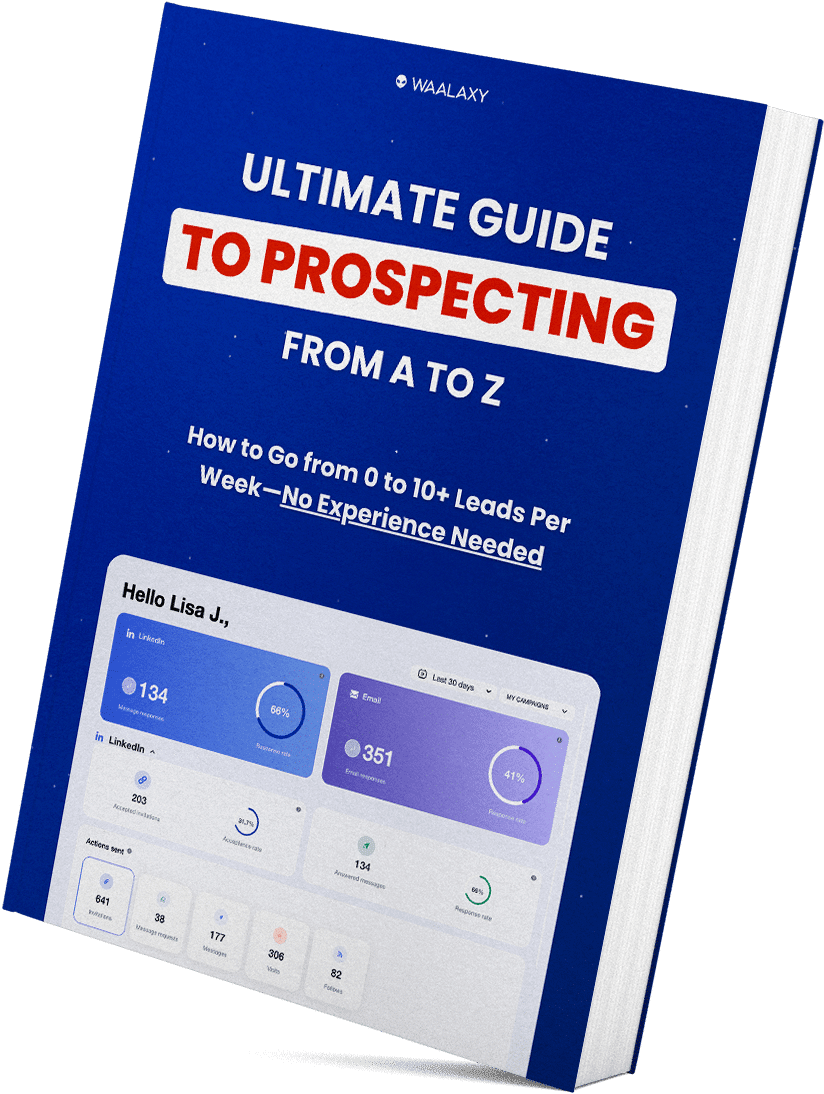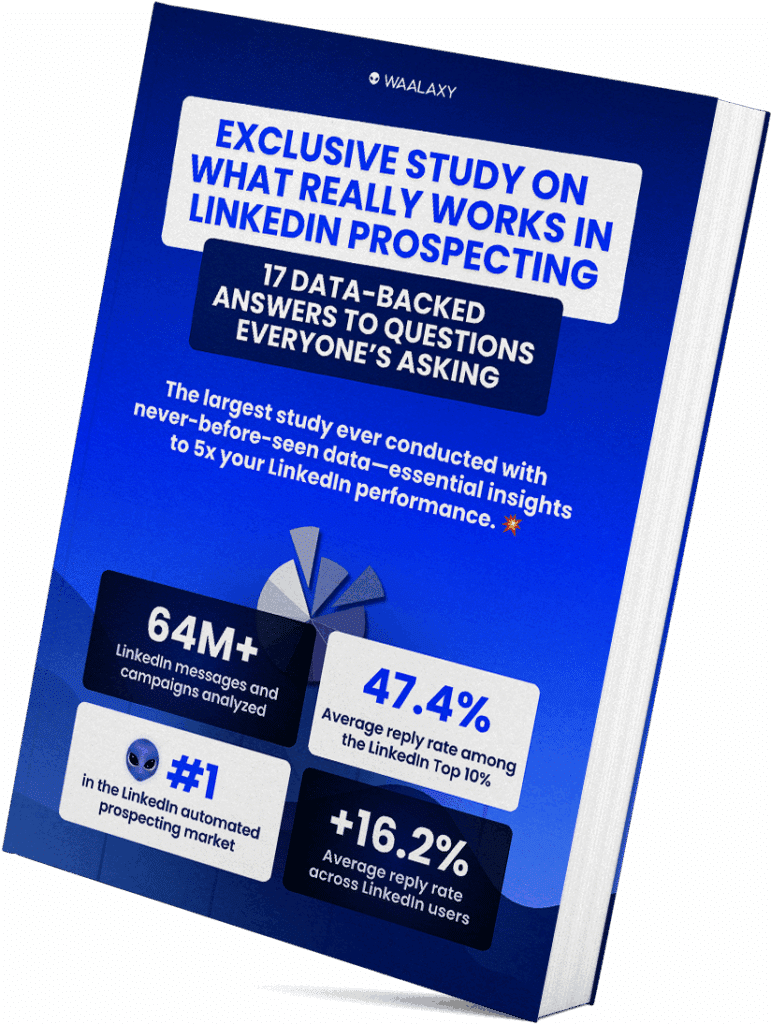When you send an e-mail to a client, recruiter or partner, it’s important to indicate that you’re waiting to hear from them to continue the process.
By using a phrase like “looking forward to hearing from you”, you show that you’re engaged in the conversation and ready to move forward. 🌞
Effective communication is essential to establishing and maintaining great professional relationships. 🧱 💪
In this article, you’ll learn how to use a professional polite formula (among 70 examples 🔥) from closing mail to improve your Inbound marketing.
Let’s go ! 🚀
Should we say “Looking forward to hearing from you”?
This is a common and appropriate formulation to express that you’re expecting a sign from your interlocutor in a pro context. (In personal life, we don’t use it too much).
Professional e-mail format
Let’s take a look at what’s usually included in a good closing. 🧐
Before presenting a series of examples, let’s look together at the structure of a good professional email:
- Subject.
- Body.
- Closing.
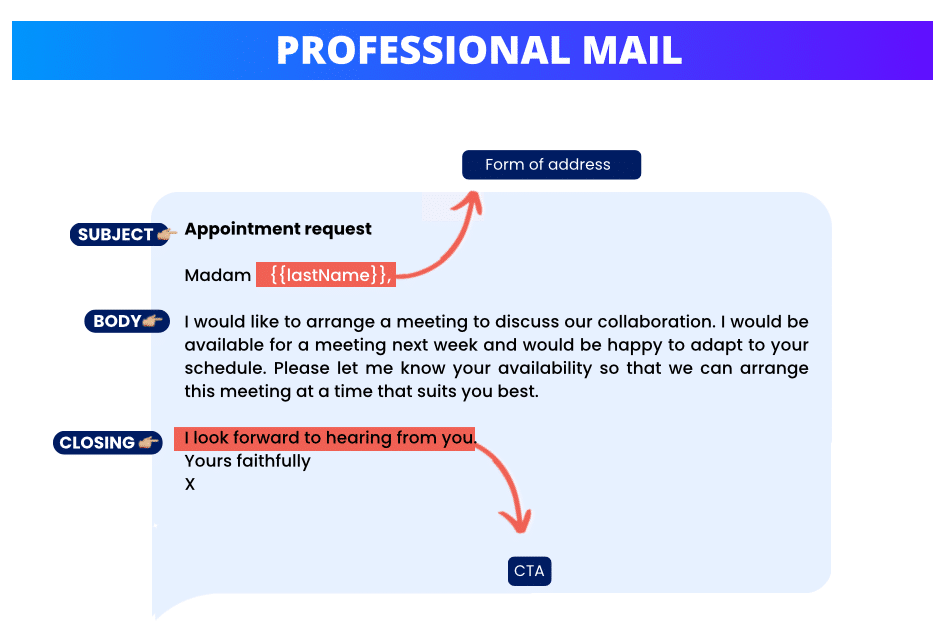
Never forget these elements when writing an email 😉
An email signature is a breathtakingly designed series of call-to-action words that will surely stand out from all the other commercial emails your contacts receive!
Tips : Create your signatures online with the templates available on Stripo, for example. Also, you have other options online! Just remember that, just like the content of an email, the email signature can also make or break its impact. 😬
How do I use “Looking forward to hearing from you”?
The expression “Looking forward to hearing from you” is commonly used in correspondence. It conveys a certain formality and a polite expectation of a response or action on the part of the recipient. It can be used in a variety of ways. Let’s find out! 👀
20 examples with “looking forward to hearing from you”.
The best way to find word sequences to end your emails is to have ready-made proposals, here are some of the best: 🎁
For recruitment
➡️ Example 1 :
“Thank you for your application and looking forward to hearing from you, I remain available for any further information.”
It shows you’re available to answer the applicant’s questions and ready to move forward in the recruitment process.
➡️ Example 2:
“We have taken careful note of your application. Looking forward to hearing from you, we wish you an excellent day.”
This shows that you’ve taken the candidate’s application on board.
Return consumer
➡️ Example 3 :
“We have received your application and thank you for it. Looking forward to hearing from you, we remain at your disposal for any further information.”
You’re showing that you’ve taken the customer’s request on board and that you’re available to answer their questions, plain and simple.
➡️ Example 4 :
“We have sent you the necessary documents to finalize the transaction. Looking forward to hearing from you, we remain available for any further assistance.”
You express that you have taken the necessary steps to help the buyer with the purchasing process and that you are available.
➡️ Example 5 :
“We look forward to receiving your response. Looking forward to hearing from you, we thank you for your trust.”
You show that you’re enthusiastic about working with the buyer.
➡️ Example 6 :
“I’ve sent you the requested documents. Looking forward to hearing from you, please don’t hesitate to contact me if you need any further information.”
The sentence explains that you have taken the consumer’s request into account and are available to provide additional documents if necessary.
➡️ Example 7 :
“We are delighted to be able to work with you. Looking forward to hearing from you, we thank you for your trust.”
This example shows that you’re grateful for the opportunity to work with the customer.
➡️ Example 8 :
“We’ve sent you the requested quote. We look forward to hearing from you if you have any further questions.”
This final example shows that you’ve responded to the consumer’s request and are available for any further questions they may have.
Customer complaint
➡️ Example 9 :
“We have taken note of your complaint. In the meantime, we are committed to finding a quick and efficient solution.Looking forward to hearing from you“
You show that you take the consumer’s concerns on board and are working on a solution to address them.
➡️ Example 10 :
“Thank you for your message regarding (problem details). We are doing everything we can to resolve this quickly. Looking forward to hearing from you if improvement.”
This example values the recognition and urgency of the situation, while remaining polite.
For a manager
➡️ Example 11:
“Thank you for your attention to this important matter. We have taken the necessary measures and are awaiting your validation before moving forward. We look forward to hearing from you.”
This example shows respect for hierarchy and the importance of managerial approval.
➡️ Example 12:
“We have finalized the requested report and it is ready for your review. Looking forward to hearing from your return for any amendments or approval.”
This values the importance of the director’s return for final validation.
For a colleague
➡️ Example 13:
“I have received your comments on the presentation and have made the necessary changes. Looking forward to your return for confirmation.”
Here, close collaboration between colleagues is encouraged.
➡️ Example 14:
“I’ve finished the first draft of our presentation for Friday’s meeting. Looking forward to hearing from you to incorporate your ideas and suggestions before finalizing it.”This message emphasizes communication between colleagues.
This message emphasizes communication between colleagues.
For a business partner
➡️ Example 15 :
“We have received your proposals and have studied them with interest. Looking forward to hearing your return to discuss next steps.’
Here, this shows an openness to discussion.
➡️ Example 16 :
“Thank you for your cooperation on this program. We have made the necessary adjustments based on our discussions. Looking forward to your return to finalize our agreement.”
This message underlines the importance of partnership and respect for mutual commitments.
In a cover letter
➡️ Example 17 :
“I would like to thank you for your interest in my application and remain at your disposal for any further information you may require. I look forward to hearing from you.”
This example demonstrates the candidate’s availability and interest in the job.
➡️ Example 18:
“Thank you for considering my application for the post of [job name]. I look forward to hearing from you for a possible interview.”
Here, the candidate explicitly expresses his desire to continue the process.
Use “we look forward to hearing from you”.
Recruitment (formal)
➡️ Example 1 :
“I have received your request for information and would like to thank you for your interest in our company. I look forward to hearing from you, and will be happy to answer any further questions you may have.”
➡️ Example 2 :
“We have carefully reviewed your application and are interested in your profile. We look forward to hearing from you.”
Buyer complaint
➡️ Example 1 :
“We have found a problem with your order and are sorry for the inconvenience. We need your confirmation in order to proceed with a replacement or refund. We look forward to hearing from you. Please keep us informed.”
➡️ Example 2 :
“We are aware that the current situation may cause delays and unforeseen circumstances. For this reason, we would like to know if you need more time to give us your answer. We look forward to hearing from you, and thank you for your understanding and cooperation.”
Customer feedback
➡️ Example 1 :
“We have received your collaboration proposal and are very interested in your offer. We look forward to hearing from you. Please find enclosed our proposed collaboration contract.”
Some examples of “looking forward to hearing from you”
For a recruiter
⭐️ This time, you’re applying for a job and you need to end your e-mail with a relevant sentence, use…
➡️ Example 1:
“Thank you for interviewing me for the position of marketing manager at your company. I am highly motivated by this opportunity and I am convinced that my skills and experience would be an asset to your team. I look forward to hearing from you.”
➡️ Example 2:
“Thank you for sending me the job advertisement for the position of Human Resources Manager at [Company name]. I am very interested in this opportunity and would like to know if we could arrange an interview to discuss my skills and objectives in more detail. I look forward to hearing from you and remain available for any further information.”
For a consumer
➡️ Example 1:
“We have received your request for a quote to design a website for your company. We have prepared a detailed proposal including costs and delivery times. We look forward to hearing from you.
➡️ Example 2:
” Thank you for your interest in our products and services. We have reviewed your requirements and are delighted to present you with our most suitable solution for your business. We are confident that it will help you achieve your business objectives. We look forward to hearing from you and are available for any further information you may require.”
What other expressions can I use in an e-mail?
In addition to the classic “I look forward to hearing from you”, there are a number of different ways to end your messages. Whether you’re looking to be more friendly or to give your message a personal touch, here are a few alternatives that are sure to hit the mark! 🎯
1) Phrases with “I’m waiting for your return”
➡️ Example 1:
“We have received your request for a quote for the design of a QSE application for your organization. We have prepared a detailed proposal including costs and delivery times. I’m waiting for your return to finalize the details.”
➡️ Example 2:
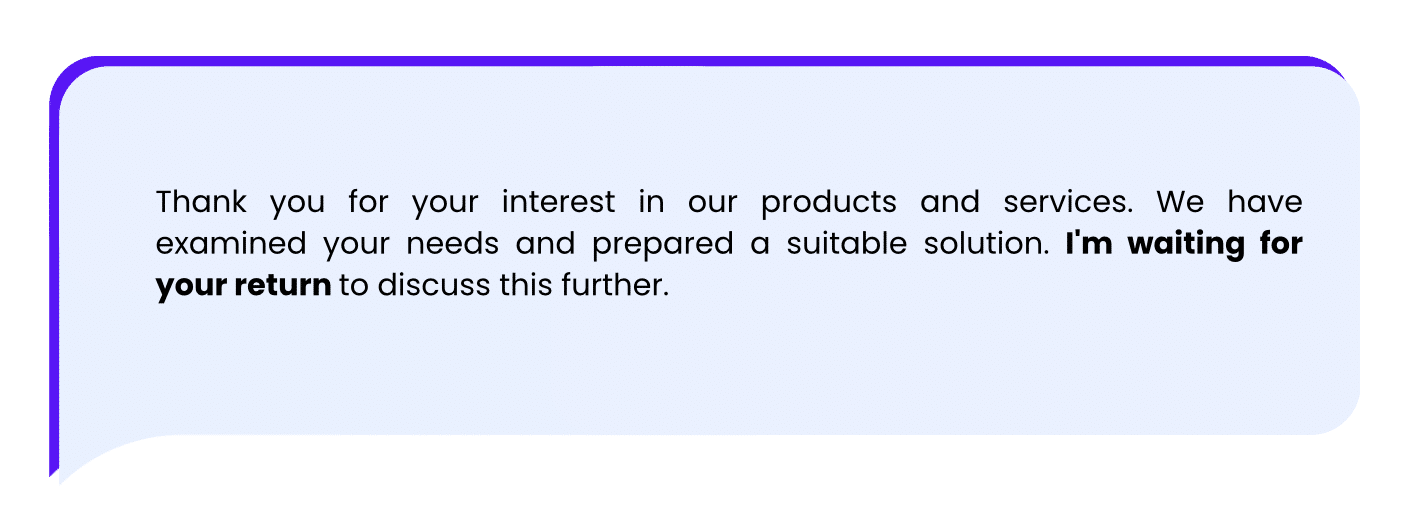
2) Use of “Thank you in advance for your feedback”.
➡️ Example 1:
“Thank you in advance for your feedback on the documents we sent. We are available for any questions you may have.”
➡️ Example 2:
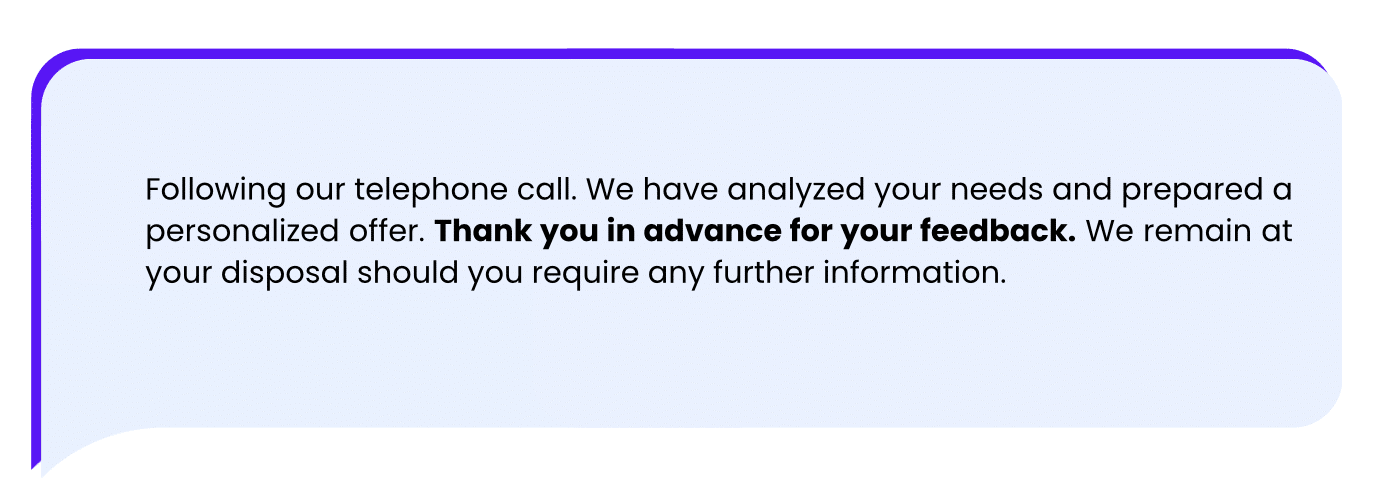
3) Expression “Thank you for contacting me”.
➡️ Example 1:
“We have received your request for information on our new product range. We have prepared a detailed brochure for you. Thank you for contacting me if you have any questions. Have a nice day.”
➡️ Example 2:
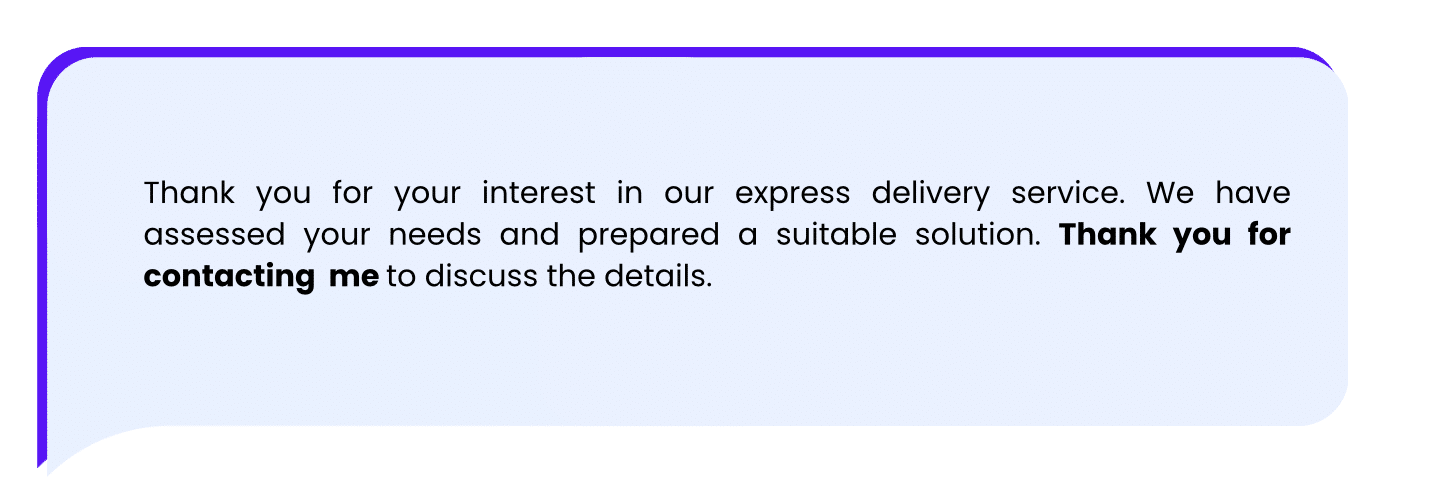
4) Sentences with “Wishing you a pleasant reception”
➡️ Example 1:
“We have received your request for a quotation for the maintenance of your equipment. We have prepared a quotation with full details of services and rates. Wishing you a pleasant reception, we look forward to your return”.
➡️ Example 2:
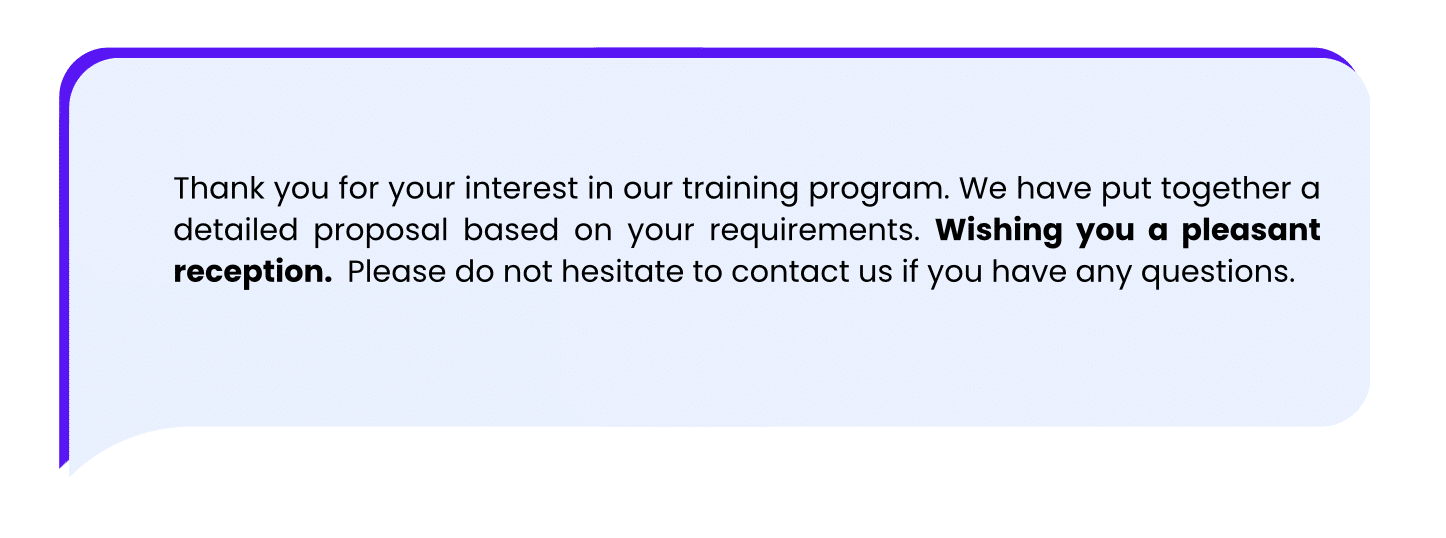
5) Using “Thank you in advance”
➡️ Example 1:
“We have received your request for information about our employee wellness program. We have prepared a detailed proposal including costs and benefits for your team. Thank you in advance for your feedback.”
➡️ Example 2:
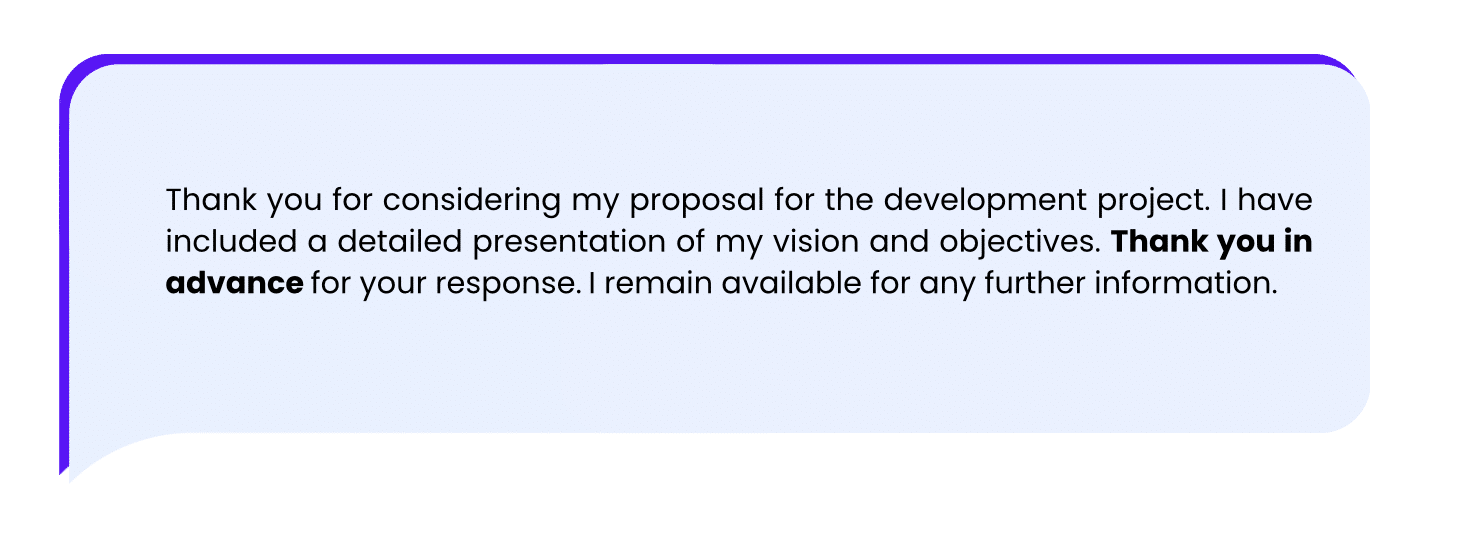
6) Phrases with “Please do not hesitate to contact us for further information”.
➡️ Example 1:
“We have received your request for a quotation for the installation of solar panels. We have prepared a proposal with all the information below. Please do not hesitate to contact us for further information.“
➡️ Example 2:
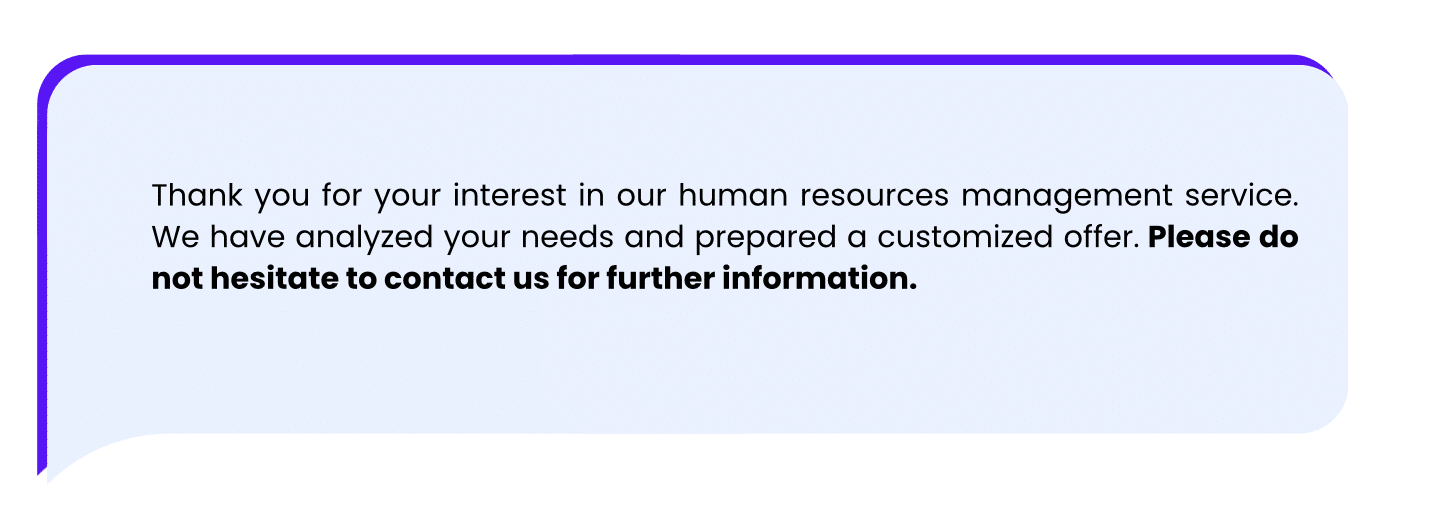
7) Use of “Wishing you a good reception”
➡️ Example 1:
“We have received your request for information about our inbound marketing solutions. Wishing you a good reception”
➡️ Example 2:
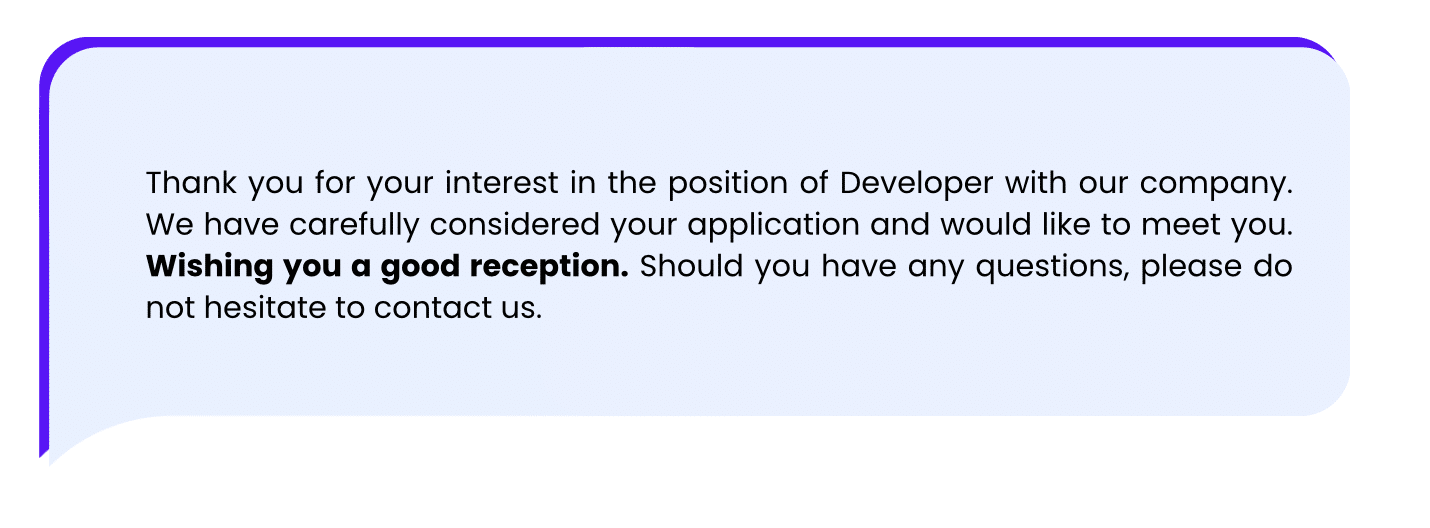
8) Phrases with “Thank you for your reply”.
➡️ Example 1:
“Thank you for your interest in our strategic partnership. We have evaluated your proposals and prepared a detailed response. I thank you for your reply and remain available for any further questions.”
➡️ Example 2:
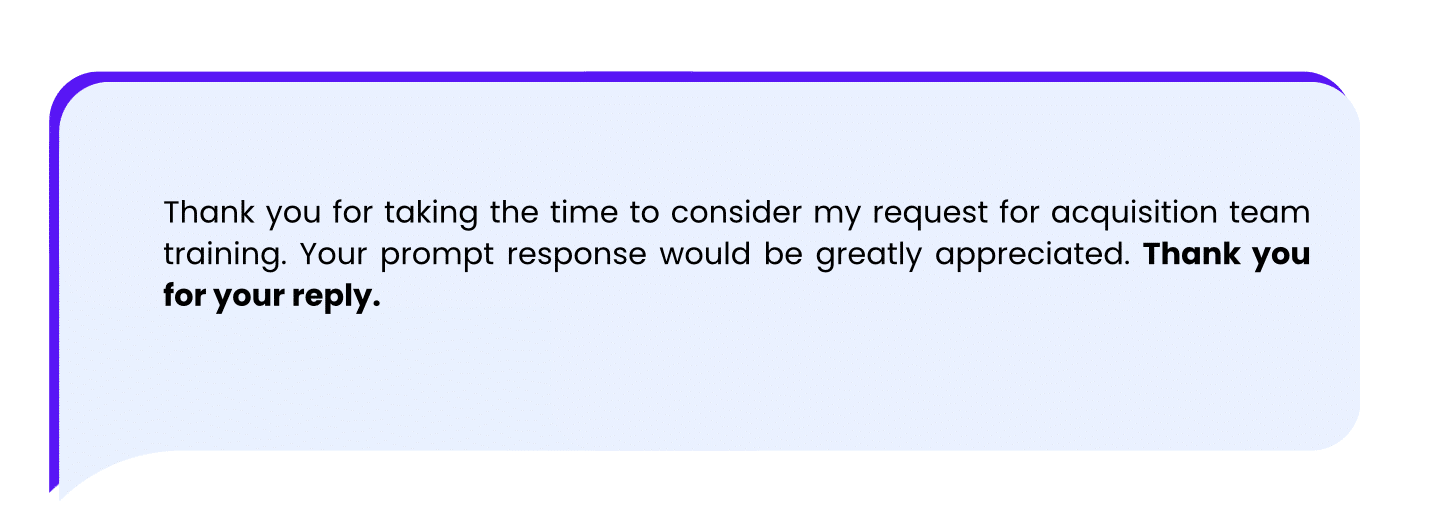
09) Expression “We look forward to hearing from you”.
➡️ Example 1:
“Thank you for your interest in my application. Thank you for taking the time to read my CV and cover letter. We look forward to hearing from you, and remain available for any further information you may require.”
➡️ Example 2:
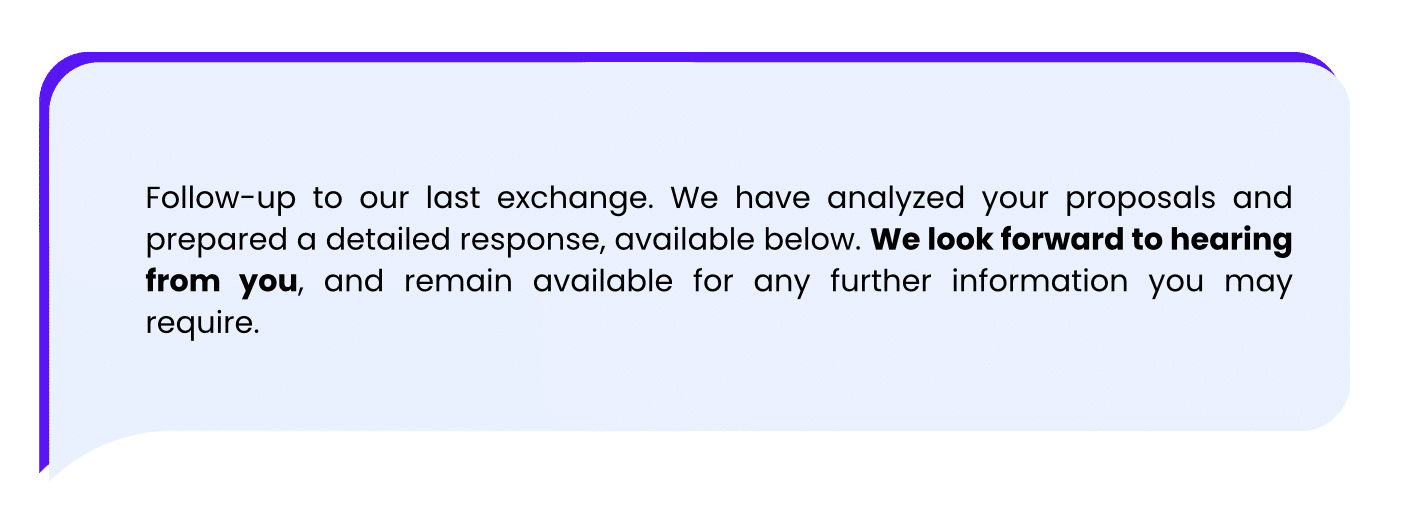
10) Phrases with “Looking forward to reading from you”
➡️ Example 1:
“Thank you for your interest in my application for the position of graphic designer. Please find enclosed my CV and covering letter. Looking forward to reading from you“
➡️ Example 2:
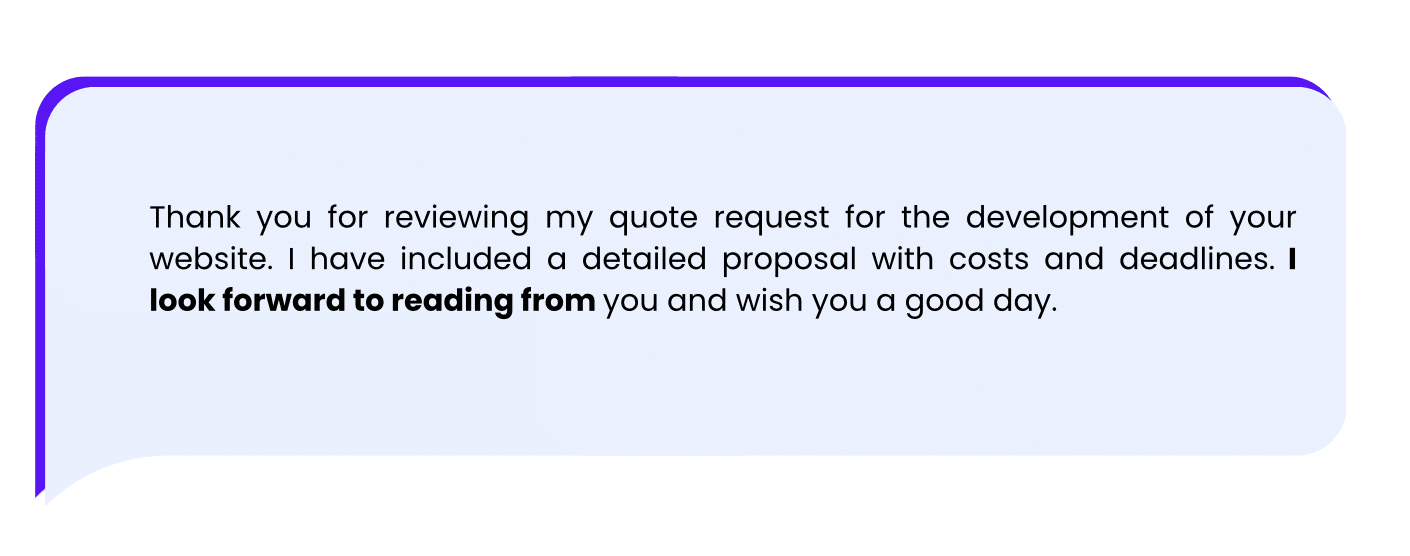
Should I say “Thank you for your feedback”?
This is a common and polite way of expressing gratitude to someone who has taken the time to reply to a message or provide documentation. Here are some examples:
➡️ Example 1:
“Thank you for your prompt feedback regarding the creation of our agile project. We’ll incorporate your suggestions and keep you informed of the next steps.”
➡️ Example 2:
“Thank you in advance for your feedback and any documents you could provide. They will be very useful in finalizing our analysis.”
⭐️ However, to avoid repetition, here are some variations you can use:
“Thank you for your prompt and comprehensive reply.”
“I’m grateful for your detailed reply.
“I’d like to thank you for the time you took to answer my questions.
“Thank you very much for your cooperation.
Finally, here are some more suggestions for thanking your contacts: 👇🏻
How do I end an e-mail?
The most common e-mail closing is just a “thank you”. Think of situations in which you would write a thank-you e-mail to someone. 🙏🏻
How do you show the recipient that you appreciate their value? What wording would be most appropriate to achieve this?
If a friend or family member has helped you with something, it should come naturally. 🥰
But what about in a commercial environment, whether in a small or medium-sized business?
Here are 30 suggested expressions to bring your message to a fitting close: 👇🏼
- Thank you for your support.
- Thank you for your time.
- Thank you, {{FirstName}}.
- Thank you so much.
- Thank you in advance.
- I am very grateful for X.
- I appreciate your help with X.
- Thank you in advance.
- Thank you very much for this opportunity.
- I really appreciate your support.
See more business appointment templates. 👇
- With thanks.
- Respectful regards.
- Yours sincerely.
- Thank you for your attention.
- Thank you for your cooperation.
- Thank you for your attention.
- With kindest regards.
- Respectfully.
- Please accept, Madam, the expression of my deepest respect.
- Yours sincerely.
- Please accept, Mr. Director, the assurances of my highest esteem.
- Please accept, Sir, Madam, my most respectful greetings.
- Please accept, Sir, my kindest and most respectful regards.
- I am at your disposal should you require any further information.
- Yours sincerely.
- I remain at your disposal to arrange a meeting in the next few days.
- Yours faithfully.
- Please accept, Sir, Madam, the assurance of my highest consideration.
- Kind regards.
How about a recap?
To conclude, let’s say you’ve worked hard to make your email attractive and understandable. So, the body of your e-mail may be impeccable, but everything can fall apart if you use the wrong polite formula to end your e-mail! 😖
It’s just a brief string of words followed by your personalized signature, but establishing the right tone to end your email frequently requires a little effort and refinement. 💪
When deciding how to end an email, it’s important to consider context too. What works for a close friend or colleague won’t work for a distant acquaintance or someone you’ve never met before, in a strictly professional setting. 🥸
Other words that may be synonymous are:
- Yours faithfully
- Yours faithfully
- Best regards,
- Yours sincerely
- Yours faithfully
- Perfect consideration,
- I look forward to hearing from you,
- Please let me have your opinion,
- Hoping to receive a positive reply from you,
- Yours faithfully
Personally, we don’t use these turns of phrase because they’re cumbersome and not very personalized. 🙊
Discover more templates for recruitment emails and email marketing campaigns.
FAQ : Phrases “Looking forward to hearing from you”
Should I use “thank you for your feedback” instead?
The expressions “thank you for your feedback” and “thank you for your reply” have the same meaning and can be used interchangeably. 🔀
But “thank you for your feedback” can give a slightly more formal or polite impression, while “thank you for your reply” is more informal and friendly. It all depends on the context and tone you wish to adopt in your communication 😉
When to use “I’ll read your message when I’m back”?
This is a phrase used to indicate that you may not be very responsive, usually when you’re on vacation. 🌞
To add the phrase “I’ll read your message when I get back” to your mailbox, you can add it to your e-mail signature.
Here’s an example of a signature that includes this statement:
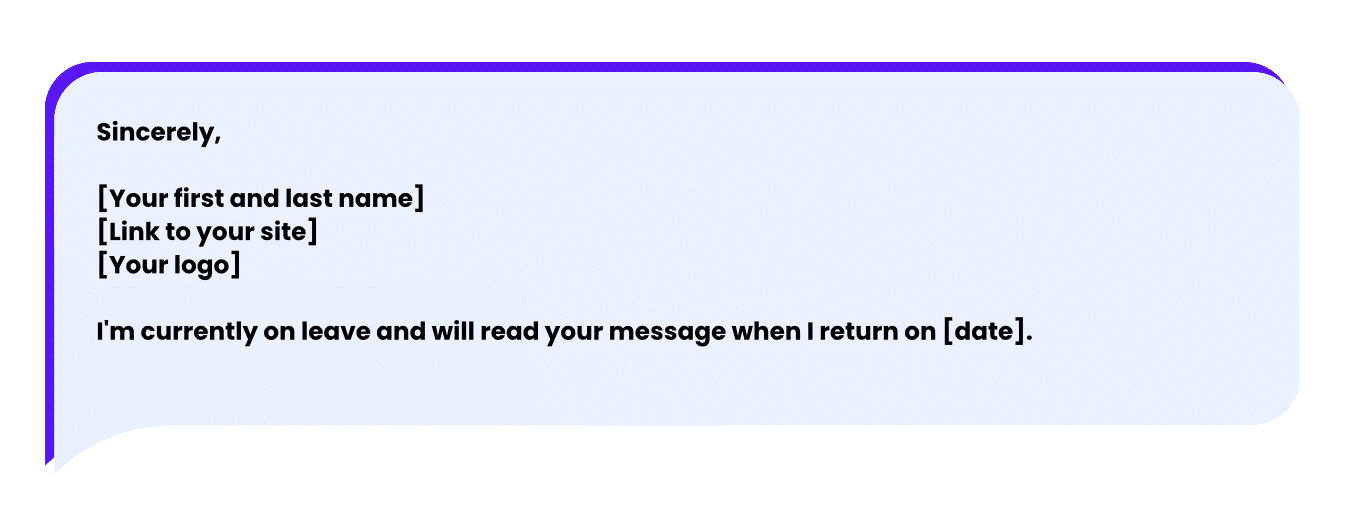
This is useful if you’re away on business or on vacation and can’t check your mailbox regularly.
And there you have it, you know all about using “looking forward to hearing from you“. 👌



